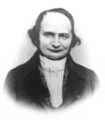Template:On This Day (nonfiction)/February 18
901: Physician, astronomer, and mathematician Thābit ibn Qurra dies. He made important discoveries in algebra, geometry, and astronomy; in astronomy, Thabit was one of the first reformers of the Ptolemaic system.
1201: Polymath Nasir al-Din al-Tusi born. Tusi will be a mathematician, architect, philosopher, physician, scientist, and theologian; he will establish trigonometry as a mathematical discipline in its own right.
1745: Physicist and chemist Alessandro Volta born. Volta will conduct pioneering experiments in electricity and electrochemistry, discovering the electrical battery; he will also discover methane.
1851: Mathematician and academic Carl Gustav Jacob Jacobi dies. He made fundamental contributions to elliptic functions, dynamics, differential equations, and number theory.
1899: Mathematician and academic Marius Sophus Lie dies. He largely created the theory of continuous symmetry and applied it to the study of geometry and differential equations.
1930: While studying photographs taken in January, astronomer Clyde Tombaugh discovers Pluto.
1967: American physicist and academic J. Robert Oppenheimer dies. His achievements in physics included the Born–Oppenheimer approximation for molecular wavefunctions, work on the theory of electrons and positrons, the Oppenheimer–Phillips process in nuclear fusion, and the first prediction of quantum tunneling. Oppenheimer has been called the "father of the atomic bomb" for his role in the Manhattan Project.
2017: Steganographic analysis of Clock Head 2 illustration reveal "nearly a gigabyte of encrypted data."








